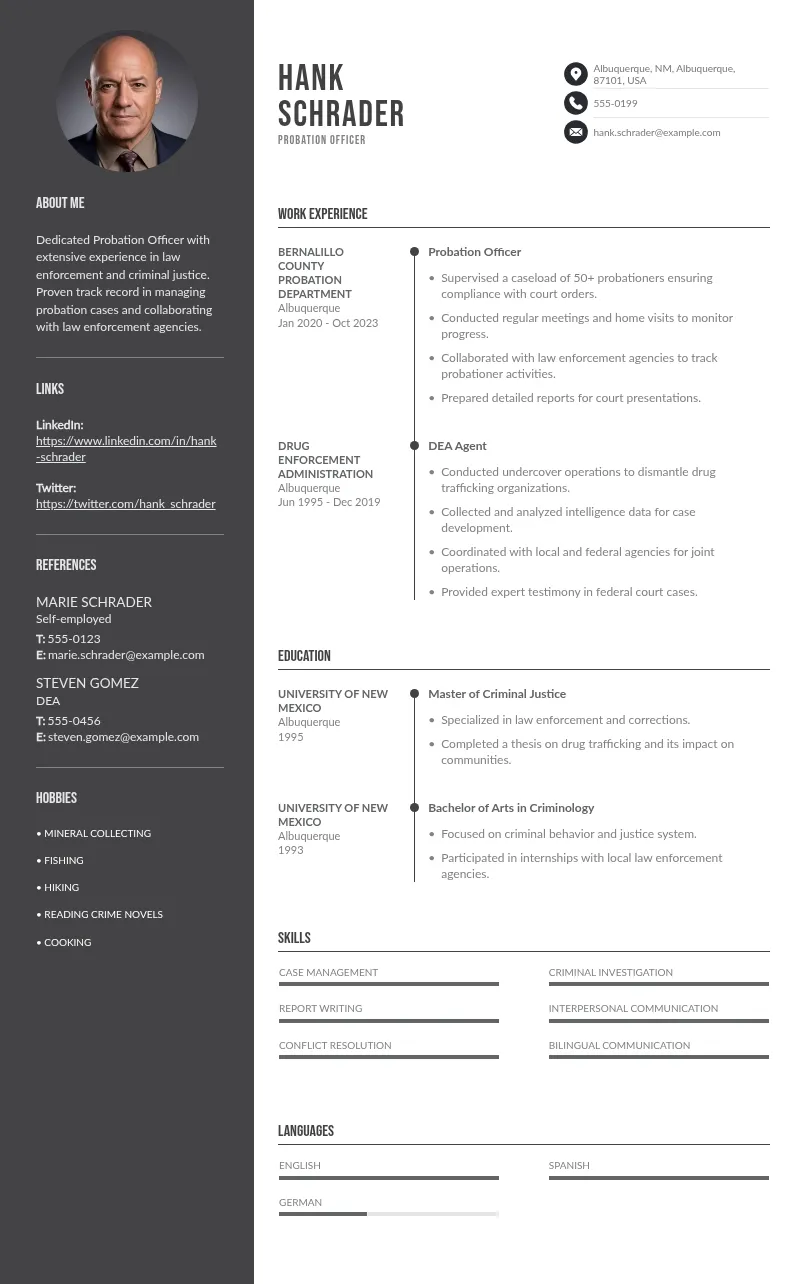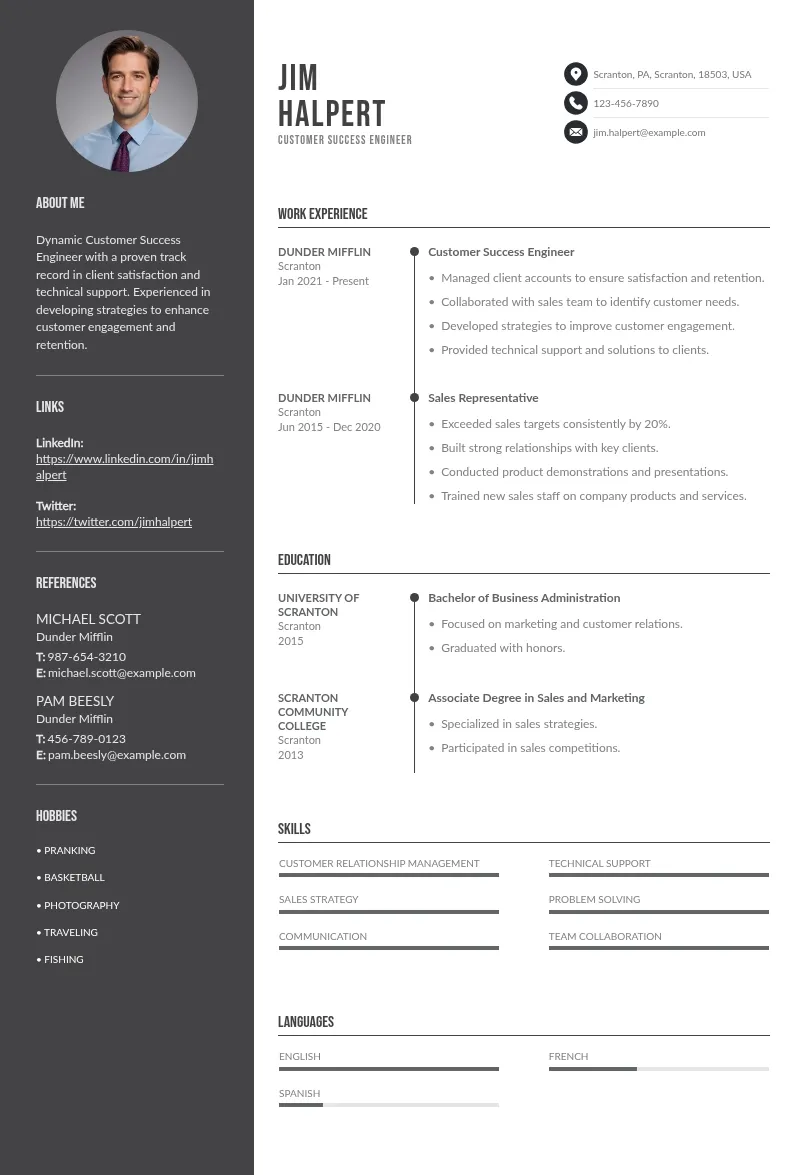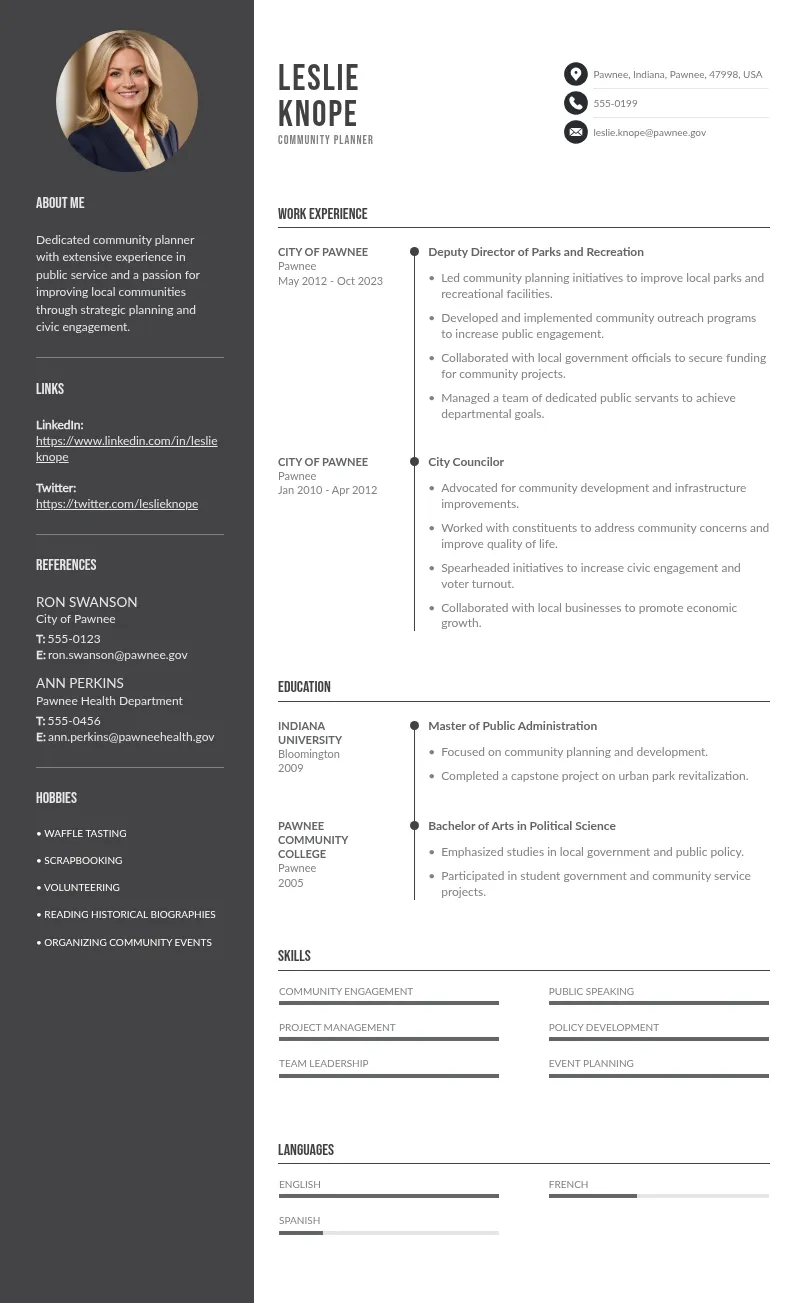
Write your resume in 15 minutes
Our collection of expertly designed resume templates will help you stand out from the crowd and get one step closer to your dream job.


This article dives into when showcasing those scores works in your favor and when it’s better to leave them off. You’ll also get practical tips for formatting your resume and learn how to make your CPA qualifications shine, ensuring you stand out to hiring managers who are ready to pounce on top talent.

How to List CPA on Your Resume
Your CPA credentials are a badge of honor, and listing them correctly can set you apart. Here’s how to feature them effectively:
1. Include "CPA" After Your Name
One of the simplest yet most impactful ways to highlight your CPA certification is by placing “CPA” next to your name at the top of your resume. This placement immediately communicates your qualifications to hiring managers before they even dive into the details.
Example:
2. Create a Certifications Section
Dedicate a section of your resume specifically to certifications or professional licenses. Use this area to highlight your CPA status and provide additional details, such as the state of licensure or license number if applicable.
Example:
3. Mention CPA Exam Progress (If Not Licensed Yet)
If you’re still in the process of obtaining your CPA license, highlight your exam progress to show employers your commitment to becoming certified. Include the sections you’ve passed and any upcoming exam dates.
Example:
4. Add CPA Scores Strategically
If you scored exceptionally well on your CPA exams or passed all sections on your first attempt, include this information to enhance your qualifications. This is especially helpful for entry-level candidates who may not yet have extensive work experience.
Example:
5. Tie CPA Into Work Experience
Your CPA expertise shouldn’t just live in the certifications section. Demonstrate how you’ve applied your CPA knowledge to deliver results in your work experience. This is particularly important for mid-level and senior professionals.
Example:

How to Write a Winning CPA Resume
Your CPA resume serves as your first impression for hiring managers, so it needs to highlight your credentials, skills, and achievements effectively. If you're a licensed CPA or still working toward certification, your resume should present a clear career narrative that emphasizes your qualifications and aligns with the job description. Below, we break down actionable tips for creating a standout CPA resume, complete with tailored examples for different career stages.
1. Summarize Your CPA Qualifications in a Professional Profile
The professional profile section is your elevator pitch, a concise snapshot that tells hiring managers why you’re the perfect candidate. This section should pack a punch by highlighting your CPA status (licensed or in-progress), top achievements, and key skills.
This is often the first section hiring managers read, and it can determine whether they keep reading your resume. A strong profile grabs attention immediately and communicates your most valuable qualifications.
Senior-Level Example:
Entry-Level Example:

2. Back Up Your Profile with Results-Driven Work Experience
The work experience section is where you demonstrate the real-world application of your CPA skills. It’s your chance to prove that you can deliver value by showcasing measurable achievements tied to specific CPA-relevant skills.
Employers want to see tangible results, not just a list of responsibilities. This section allows you to highlight the impact you’ve had in previous roles, be it through saving costs, improving processes, or ensuring compliance.
Steps:
- Begin each bullet with an action verb, such as "Led," "Implemented," or "Streamlined."
- Quantify achievements when possible (e.g., "Saved $50K annually," or "Improved audit efficiency by 20%").
- Link your accomplishments to CPA-relevant skills like financial reporting, audit compliance, or tax planning.
Mid-Level Example
Entry-Level Example

3. Include Certified Public Accountant Credentials
Your CPA credentials are one of the most critical elements of your resume, and they need to stand out. This section ensures that hiring managers can easily spot your certification and understand your progress toward licensure if you’re still working on it.
Employers in accounting and finance value certifications like CPA above almost everything else. A clear and prominent certifications section instantly communicates your professional qualifications.
How to Structure It:
- Title this section "Certifications" or "Professional Licenses."
- Include details like your licensure status, state of licensure, and any additional certifications (e.g., CMA, Certified Fraud Examiner).
- For CPA candidates, include your exam progress and testing dates for any remaining sections.
Example for Licensed CPA
Example for CPA Candidate
4. Highlight Relevant Education and Coursework
For recent graduates or entry-level candidates, the education section is an excellent place to tie your academic background to your CPA progress. Highlighting relevant coursework can also help reinforce your technical knowledge.
Early-career candidates may lack professional experience, so education becomes a focal point. Linking your CPA exam progress to your degree demonstrates initiative and dedication to becoming a CPA.
Example for Entry-Level Candidate

5. Showcase Key Skills and Proficiencies
A skills section can help your resume stand out, especially if it includes keywords that align with the job description. Many companies use applicant tracking systems (ATS) to scan resumes for specific terms, so this section is essential for getting past automated filters.
Hiring managers and ATS systems look for relevant technical and soft skills that match the role. This section provides a quick overview of your capabilities and shows how you can meet the job’s demands.
Key Skills and Proficiencies:
- Financial Reporting | Tax Preparation | Risk Management
- Accounting Software: QuickBooks, SAP, Oracle Financials
- Advanced Excel (pivot tables, macros) | Internal Auditing | Budget Analysis
Examples for Different Career Stages
Here’s how to tailor your resume based on your career level:
Entry-Level Example

Mid-Level Example
Career Changer Example

Student Applying for an Internship
For students seeking internships, even partial CPA exam progress can make a strong impression.
Example:
Why CPA Exam Scores Are Important
Including CPA exam scores on your resume can significantly boost your chances, especially for roles that require accounting expertise and a strong foundation in financial principles. Here’s why:
- Showcase Technical Expertise: CPA scores highlight your mastery of financial reporting, audit procedures, and tax preparation, showcasing your readiness for technical roles.
- Demonstrate Dedication and Discipline: Passing the CPA exam, especially on the first attempt, reflects your ability to handle tight deadlines and high-pressure situations, skills critical for financial planning and risk management.
- Bridge Experience Gaps: For entry-level candidates, strong scores can compensate for limited experience, proving you’re equipped to handle audit efficiency and ensure financial accuracy.
- Stand Out in Competitive Fields: High scores make you a standout candidate for roles like auditing, financial analysis, and internal controls, demonstrating your potential to succeed in complex, detail-driven environments.

When and Why to Skip CPA Exam Scores
Sometimes, it’s better to leave CPA exam scores off your resume. For licensed CPAs with extensive experience, professional achievements like improving financial processes or leading audits carry more weight than exam results, so it’s best to focus on those accomplishments. Similarly, if your scores are average or just passing, they won’t add much value.
Instead, emphasize certifications, technical skills, or measurable achievements, such as ensuring compliance or uncovering cost savings. Finally, if the role prioritizes leadership or strategic management over technical expertise, highlight skills like collaboration, project management, or team leadership. Skipping scores in these scenarios allows you to keep the focus on what’s most relevant to the job.
Common Mistakes to Avoid on Your CPA Resume
Steer clear of these common pitfalls to ensure your CPA resume shines:
- Including Salary Requirements: Save salary discussions for the interview; focus your resume on your qualifications and skills.
- Grammatical or Spelling Errors: Mistakes reflect poorly on your attention to detail. Proofread carefully or have a colleague review your resume.
- Wordy Descriptions: Keep statements concise and impactful. Highlight achievements in a one-page resume.
- Irrelevant Details: Focus on relevant experience, certifications, and skills. Leave off unrelated roles or unnecessary personal information.

Leveraging Your CPA Credentials in Networking
Your CPA credentials can open doors, but networking effectively requires strategy. Here’s how to make them work for you:
1. Maximize Your LinkedIn Profile
Your LinkedIn profile is often the first place recruiters and potential employers look. Add “CPA” to your headline and showcase key achievements in your “About” section to make your profile stand out.
Example Headline:
2. Engage in Professional Communities
Join LinkedIn groups, local CPA societies, or online forums where accounting professionals gather. Actively participating in these communities allows you to build relationships, share knowledge, and stay updated on industry trends.
3. Attend Networking Events
Use your CPA certification as a conversation starter during industry events, conferences, or workshops. Highlight your achievements in a concise pitch to showcase your expertise.
Example Pitch:
4. Volunteer Your Expertise
Offer to mentor aspiring CPAs, host workshops, or contribute to professional panels. This not only demonstrates leadership but also builds meaningful connections with other professionals.
5. Highlight CPA Accomplishments
When discussing your qualifications, tie your CPA credential to specific achievements to make a stronger impact.


















